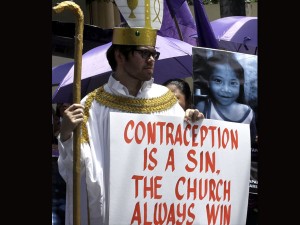
A protester dressed as a priest displays a placard at rally outside the Supreme Court Tuesday to coincide with the oral arguments by the highest court on the merits and demerits of the RH law. AP PHOTO
MANILA, Philippines – The question on when life begins was irrelevant to the constitutionality of the Reproductive Health Law and the Supreme Court was unlikely to resolve debates on the age-old debate, proponents of the contentious law said on Wednesday.
Ifugao Representative Teddy Baguilat Jr., one of the authors of the RH Law in the 15th Congress, said he felt that defining when life begins was “not within [the high court’s] purview.”
He maintained that the issue on the new law was not one “of ethics or disenfranchising religions” but was instead on the protection of the health of mothers and infants.
Lengthy discussions on when life begins plagued the RH Law’s deliberations in Congress and Baguilat said, “We have not arrived at a consensus despite three years of debate.”
The same issue hounded the RH Law when the high court kicked off its hearing Tuesday.
ACT Teachers Partylist Representative Antonio Tinio echoed this observation, saying that the justices made it clear during the start of the oral arguments on the RH Law that such medical or theological questions were “beyond the competence of the Supreme Court.”
“The line of argument of the antis so far has been irrelevant to the question of whether or not the RH Law is constitutional,” he said.
Baguilat said pro-RH lawmakers were monitoring the RH Law’s developments and were prepared “to thwart other possible moves of anti-RH congressmen to block the law’s implementation or introduce a repeal.”
The debate on when life begins was seen as a “nuisance suit” by Akbayan Partylist Representative Walden Bello.
“The Supreme Court should treat it as such,” he urged the high court.
While it seemed that the Supreme Court was “bending over backward” for the Church by hearing such arguments, Bello was “cautiously confident” that the high tribunal would rule in favor of the RH Law.
He said that the high court may be listening to the anti-RH camp’s arguments “so that when it rules in favor of the law, the Church will not be able to say it was biased.”
“The Supreme Court, I think, will not allow itself to be the instrument for the reintroduction of theocracy in the Philippines,” said Bello.